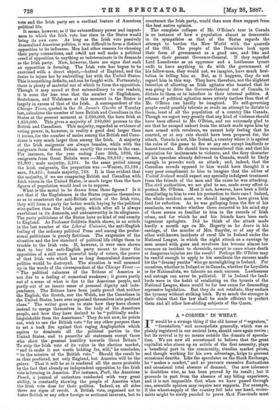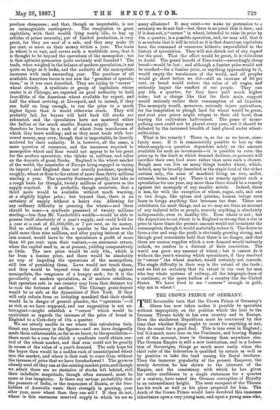A " CORNER " IN WHEAT.
IT would be a strange thing if the old horror of " regratere," "forestallers," and monopolists generally, which was so plainly registered in our ancient laws, should once again revive ; but its revival is by no means outside the domain of specula- tion. We are now all accustomed to believe that the great capitalist who stores up an article of the first necessity, plays a beneficial part in the community, steadies market prices, and though working for his own advantage, helps to prevent occasional dearths. Like the speculator on the Stock Exchange, he " makes a market," and so prevents excessive fluctuations and occasional total absence of demand. Our new tolerance is doubtless wise, as has been proved by its result ; but it proceeds in part from the absence of any biting experience, and it is not impossible that when we have passed through one, scientific opinion may require new supports. For example, if the wheat-supply of the country fell into one hand, econo- mists might be sorely puzzled to prove tint Free-trade must
produce cheapness ; and that, though an improbable, is not
an unimaginable contingency. The temptation to great capitalists, with their wealth lying nearly idle, to buy up articles of prime necessity, yet of limited production, is very great, for they are sure of a sale, and they may make 20 per cent. or more on their money within a year. The trade in wheat is so vast, and covers such a worldwide area, that it is thought to be beyond the operations of the monopolist ; but is that optimist persuasion quite certainly well founded ? The trade, when weighed in the balance of modern speculation,is not quite so large as it looks, and the audacity of the monopolists increases with each succeeding year. The purchase of all available American bacon is not now the " grandest of specula- tions," as it was once described. They are trying to " corner " wheat already. A syndicate or group of capitalists whose centre is at Chicago, are reported on good authority to hold four-fifths of the American wheat available for export, and half the wheat arriving at Liverpool, and to intend, if they can hold on long enough, to run the price to a much higher figure than it would otherwise reach. They will probably fail, for buyers will hold back till stocks are exhausted, and the speculators have not mastered either the Indian or the much smaller Russian supply. They may therefore be beaten by a rush of wheat from warehouses of which they knew nothing; and as they must trade with bor- rowed money, may even, though that is improbable, be heavily mulcted for their audacity. It is, however, all the same, a mere question of resources, and the resources required to monopolise wheat and flour would not appear to be too great for the modern speculator, who thinks in millions, and relies on the deposits of great Banks. England is the wheat market of the world, the remainder of Europe being engaged in taxing its import ; and England does not usually purchase, speaking roughly, wheat or flour to the extent of more than thirty millions sterling a year. The quantity fluctuates greatly, but take as a rough basis for thought, twenty millions of quarters as the supply required. It is probable, though uncertain, that a third more would be available without much warning, at a slightly higher price ; but beyond that, there is no certainty of supply without a heavy rise. Allowing for any ordinary difficulty in pawning the wheat—and there should be none—a syndicate possessed of twenty millions sterling—less than Mr. Vanderbilt's wealth—would be able to possess itself absolutely of a year's supply, and could hold for a year at a coat of £1,400,000, or 7 per cent. on its money. But an addition of only 10s. a quarter to the price would yield more than nine millions, and after paying interest at the rate named, would leave to the speculators a profit of more than 40 per cent. upon their venture,—an enormous return, when the capital used is, as at present, yielding comparatively so little. The new price would be only 43s., which is far from a famine price, and there would be absolutely no way of impeding the operations of the monopolists, still less of punishing them. Laws would not touch them, and they would be beyond even the old remedy against monopolists, the vengeance of a hungry mob ; for it is the peculiarity of modern speculation, as of modern rebellions, that operators safe in one country may from that distance try to ruin the fortunes of another. The Chicago grain-buyers would be as safe as the dynamitera of New York. If they will only refrain from so irritating mankind that their stocks would be in danger of general plunder, the "operators "—if as rich as we have supposed, and our supposition is not ex- travagant—might establish a " corner " which would be equivalent as regards the increase of the price of bread in England to a Corn-duty of 10s. a quarter.
We are utterly unable to see where this calculation fails. Grant any inaccuracy in the figures—and we have designedly made them unfavourable, so far as we know, to the speculation— there must be a sum for which a syndicate could obtain con- trol of the wheat market, and that sum could not be greatly in excess of the value of a year's demand. The only hope for the buyer then would be a sudden rush of unanticipated wheat into the market, and where is that rush to come from without the increase of price that we have foreshadowed V The growers already send all they can at the existing market price,and though we admit there are no statistics of stocks left behind, still their indefinite magnitude, though often assumed, must be more or less imaginary. Is there any serious probability that the peasants of India, or the communes of Russia, or the free- holders of Australia waste their strength in growing, year after year, more wheat than they can sell I If they do not, where is this enormous reserved supply to which we see so
many allusions ? It may exist—we make no pretension to a certainty we do not feel—but there is no proof that it does; and if it does not, a "corner " in wheat, intended to raise its price by 10s. a quarter, is a possible operation, and, we may add, that it is as certain that it will be tried as it is that American capitalists have the command of resources hitherto unparalleled in the history of speculation. They will not shrink out of any regard for the poor. That the effect would be great, it is ridiculous to doubt. The grand benefit of Free-trade—exceedingly cheap bread—would be lost ; and although a famine price would not be reached—for a famine price, or anything approaching to it, would empty the warehouses of the world, and all peoples would go short before we did—still an increase of 30 per cent. on bread would reduce the value of all wages, and seriously impair the comfort of our people. They can pay 43s. a quarter, for they have paid much higher rates ; but a charge like that for their main support would seriously reduce their consumption of all luxuries. The monopoly would, moreover, seriously injure agriculture, for the temptation to plough land for wheat would be great, and next year prices might relapse to their old level, thus leaving the cultivators half-ruined. The game of mono- polising corn could not be played every year, lest it should be defeated by the increased breadth of land placed under wheat- cultivation.
What is the remedy ? There is, so far as we know, abso- lutely none. If it is commercially possible to buy up the wheat-supply—a question dependent solely on the amount available for such an investment—it is possible to raise the price up to the limit at which demand declines, or peasants will sacrifice their own food store rather than miss such a chance. Rough men can live on many things besides wheat, which, indeed, may be broadly described as the staple food of the richer nations only, the mass of mankind living on rice, millet, oatmeal, beans, and rye. There is no remedy against such a speculation for one year, any more than there would be a remedy against the monopoly of any smaller article. Indeed, there is less, for with the exception of wheat, sugar, salt, and one or two drugs, like opium and quinine, human beings soon learn to forego anything that becomes too dear. There are substitutes for most things, and as we may see from an account of any isolated tribe or people, scarcely anything is absolutely indispensable, even to healthy life. Even wheat is not ; but the disposition to eat wheat is in England so strong that a rise in price to three times the present amount would not terminate the consumption, though it would materially reduce it. The desire to force a rise and reap the profit is obviously growing strong, and though good economists hold that there is no danger, and that there are unseen supplies which a new demand would instantly unlock, we confess to a distrust of their conviction. The world can grow any amount of wheat ; but it cannot do it without the year's warning which speculators, if they resolved to " corner " the wheat market, would certainly not concede. The single difficulty in their way is the extent of the trade ; and we feel no certainty that its extent is too vast for men who buy whole systems of railway, all the telegraph-lines of a continent, or the spare bullion of a country like the United States. We have lived to see " corners " enough in gold, why not in wheat ?



































 Previous page
Previous page